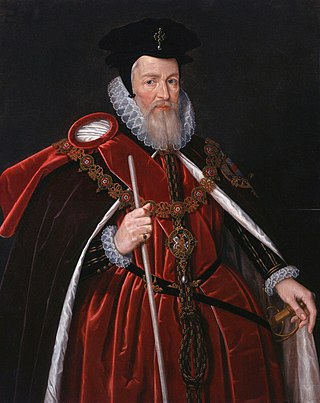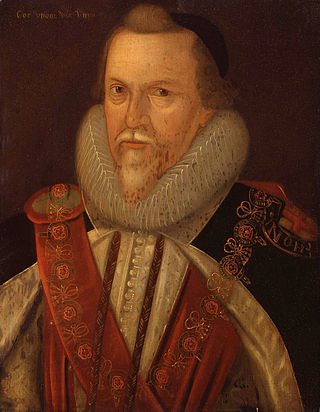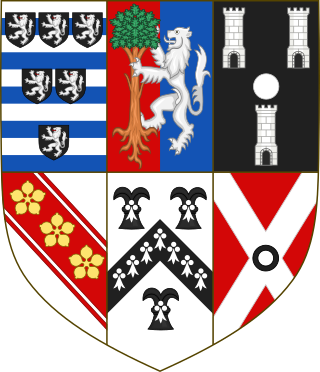Related Research Articles

William Cecil, 1st Baron Burghley was an English statesman, the chief adviser of Queen Elizabeth I for most of her reign, twice Secretary of State and Lord High Treasurer from 1572. In his description in the Encyclopædia Britannica Eleventh Edition, A.F. Pollard wrote, "From 1558 for forty years the biography of Cecil is almost indistinguishable from that of Elizabeth and from the history of England."

Robert Cecil, 1st Earl of Salisbury, was an English statesman noted for his direction of the government during the Union of the Crowns, as Tudor England gave way to Stuart rule (1603). Lord Salisbury served as the Secretary of State of England (1596–1612) and Lord High Treasurer (1608–1612), succeeding his father as Queen Elizabeth I's Lord Privy Seal and remaining in power during the first nine years of King James I's reign until his own death.

Richard Neile was an English churchman, bishop successively of six English dioceses, more than any other man, including the Archdiocese of York from 1631 until his death. He was involved in the last burning at the stake for heresy in England, that of the Arian Edward Wightman in 1612.

Sir Robert Harley was an English statesman who served as Master of the Mint for Charles I. A devout Puritan, he supported Parliament in the Wars of the Three Kingdoms.

Thomas Cecil, 1st Earl of Exeter, KG, known as Lord Burghley from 1598 to 1605, was an English politician, courtier and soldier.

John Manners, 8th Earl of Rutland, was an English politician who sat in the House of Commons from 1640 until 1641 when he inherited the title Earl of Rutland on the death of his second cousin George Manners, 7th Earl of Rutland.

William Pierrepont was an English politician who sat in the House of Commons at various times between 1640 and 1660. He supported the Parliamentary cause in the English Civil War.

William Cecil, 2nd Earl of Exeter,, known as the third Lord Burghley from 1605 to 1623, was an English nobleman, politician, and peer.

Philip Sidney, 3rd Earl of Leicester was an English politician who sat in the House of Commons at various times between 1640 and 1659 and became Earl of Leicester in 1677. He supported the Parliamentarian cause in the Wars of the Three Kingdoms, when he was known as Viscount Lisle, a subsidiary title of the Earls of Leicester.
Edward Forset (1553–1630) was an English official, politician and writer, known for political works and as a playwright.

John Stanhope, 1st Baron Stanhope was an English courtier, politician and peer.
Dr. Calybute Downing (1605–1643) was an English clergyman, a member of the Westminster Assembly. Also a civil lawyer, he is now remembered for political views, which moved from an absolutist position in the 1630s to a justification of resistance to authority by 1640, within a contractarian setting.

In the Kingdom of England, the title of Secretary of State came into being near the end of the reign of Elizabeth I, the usual title before that having been King's Clerk, King's Secretary, or Principal Secretary.
David Cecil, 3rd Earl of Exeter was an English peer and member of the House of Lords.
Charles Cecil, Viscount Cranborne MP, was an English nobleman and politician who sat in the House of Commons from 1640 to 1648.
Sir Thomas Hatton, 1st Baronet was an English politician who sat in the House of Commons of England variously between 1621 and 1640.
Sir William Lytton DL JP was an English politician who sat in the House of Commons from 1640 to 1648. He supported the Parliamentary cause in the English Civil War.

Sir William Drury was an English landowner and member of parliament. He was the father of Sir Robert Drury, patron of the poet John Donne.
Sir Robert King was an Irish soldier and statesman.
William Ashton (1575–1646) was the English Member of Parliament for Hertford in 1621–1625 and Appleby in 1626 and 1628.
References
- ↑ "Cecil, Robert (CCL634R)". A Cambridge Alumni Database. University of Cambridge.
- ↑ Willis, Browne (1750). Notitia Parliamentaria, Part II: A Series or Lists of the Representatives in the several Parliaments held from the Reformation 1541, to the Restoration 1660 ... London. pp. 229–239.